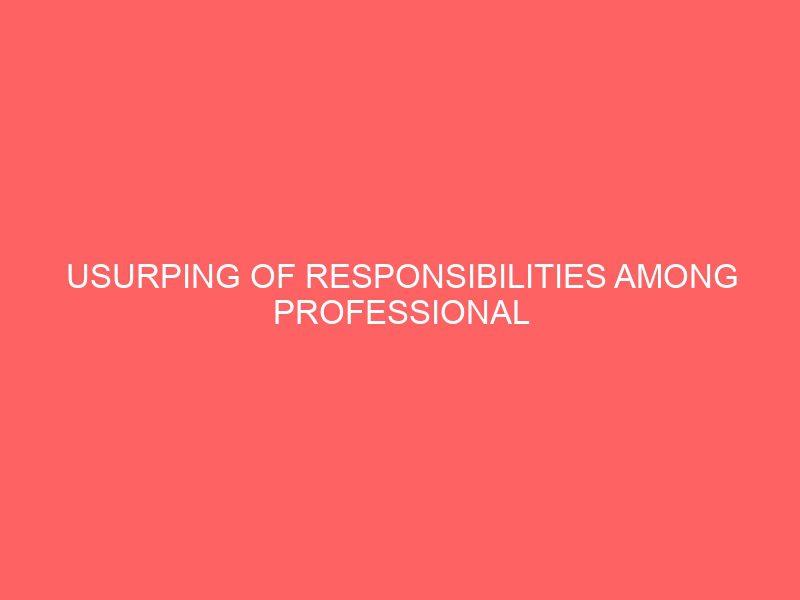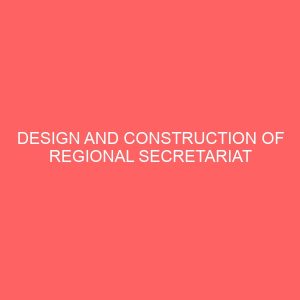Description
CHAPTER ONE 1.0 Introduction The construction industry plays a vital role in the economic development of any country. The state of the industry gives a fair indication of a Nations economy. Between 1971 and 1975, the constitution industry in Nigeria emerged as a dominant feature of the Nations economic development as a result of high activity level in the sector occasioned by the after civil war reconstruction and oil boom which stimulated execution of various private and public project ranging from new starts to rehabilitation of damaged and dilapidated buildings and other infrastructures. The industry however, witnessed decline from 1976 as a result of economic recession, a trend which has persisted to the present.
Despite the lull, the industry has continued to expand due the rapid urbanization and population growth which have increased demand for housing and other infrastructural facilities. Similarly, the expansion of the structure of governance to the grass root level have also contributed to the demand for the various products of the construction industry which include buildings and roads. Design and construction of these products are guided by certain criteria guidelines or standards. These are usually formulated based on wide representation and articulation of diverse needs and view points observed over a considerable length of time. They are thus expected to guarantee user expectations that products and services are safe, reliable, and suited for the purposes claimed by their manufacturers or providers.
Unfortunately, the Nigeria construction industry has been characterized by lack of adequate standards to guide activities in the industry. OPOKO, ALI, 2005.
The industry has many features which set it apart from other process industries and which accentuate the need for professional management. Each order in the construction industry leads to a oneoff client made product. The team set up to produce a building is in existence only for the duration of that particular project run. The team for each project is assembled from a disparate collection of professionals, subcontractors, craftsmen, artisans, labourers, and suppliers within the industry and outside. AYO BAMISLE, 2004.
The professionals in the construction industry are many and diverse in nature. They are expected to have been scientifically and technically instructed.
The professionals are:
1 Architect
2 Builder
3 Engineers Geotechnical, Structural, Electrical, etc.
4 Quantity surveyor
5 Estate surveyor
6 Town planner
7 Land Surveyor
They order of listing does not indicate the superiority or otherwise of one professional over others ogunbiyi, 2003.
All members of the construction team bear heavy responsibilities, in accordance with their codes of conduct and constitution, and it is the duty of the various professional bodies to assist their individual members to discharge their respective responsibilities in an effective manner. The following are the professional bodies.
1 ARCON: Architect Registered council of Nigeria
2 CORBON: Council of Registered Builders of Nigeria
3 CREN: Council of Registered Engineers of Nigeria
4 QSRBON: Quantity Surveyor Registration Board of Nigeria
5 SURCON: Surveyors Registration council of Nigeria
6 ESURBON: State Surveyors and Values Registration Board of Nigeria
7 TOPREC: Town Planning Registration Council of Nigeria
Apart from the professionals mentioned earlier, there are other organizations that also have input in the construction industry. They are:
1 Technician societies
2 Employers organization/Federation
3 Research organization
4 Trade Association and
5 Employers Association
For these organizations to discharge their duties, they must relate not only to the other professional groups but also respond to the codes and ethical standards of the industry. This is to ensure stable and functional approach to policy implementation. Ogunbiyi, 2003.
There are artisans and craftsmen which are equally important in the industry. In spite of advancement in technology, plant and equipment and in particular robotics, the construction industry is one of the few that still relies heavily on individuals skill of a tradesman. They are:
1 Block layers/ Brick layer
2 Steel fixers
3 Plumbers
4 Electricians
5 Floor and wall tillers
6 Terrazzo layers
7 Roofers
8 Aluminium/Metal fixers
9 Plasterers
10 Painters etc.
According to Ogunbiyi 2003, the bureaucracy and the Nigeria factor has prevented each body to play its own statutory role in making the construction industry in Nigeria a model for other countries. It is unfortunate indeed that what, we have today is inter and intra squabbles between professional bodies waging unwinnable and self destroying battles against each other functions, forgetting that professional borderlines are not elastic.
1.1 Aim and Objectives
The aim of this project is to find out how the usurping of responsibilities among professionals in the construction industry is affecting the professional involved in the industry and the economy of the country.
The following are the objectives:
1 Ascertaining the involvement of each professional in the industry
2 To determine the various problems affecting the professional and their lapses
3 To ascertain areas of usurping of responsibilities among professional in the construction industry
1.2 Scope and Limitation of the Study
The seven professionals in the construction industry in accordance with their various construction and codes of conduct have roles and duties they are to discharge in and outside the industry. But this research work is based on how some of these professionals are performing their duties and the effect of the usurping of responsibility among professional in the industry.
1.3 Methodology of Research
The research will be conducted by survey and extraction of facts from literature, oral interview with various participant in the building industry and sampling of different opinion through the use of questionnaire to be administered by the participants in the industry after which the questionnaires will be analyzed and detailed in the subsequent chapter.








Reviews
There are no reviews yet.